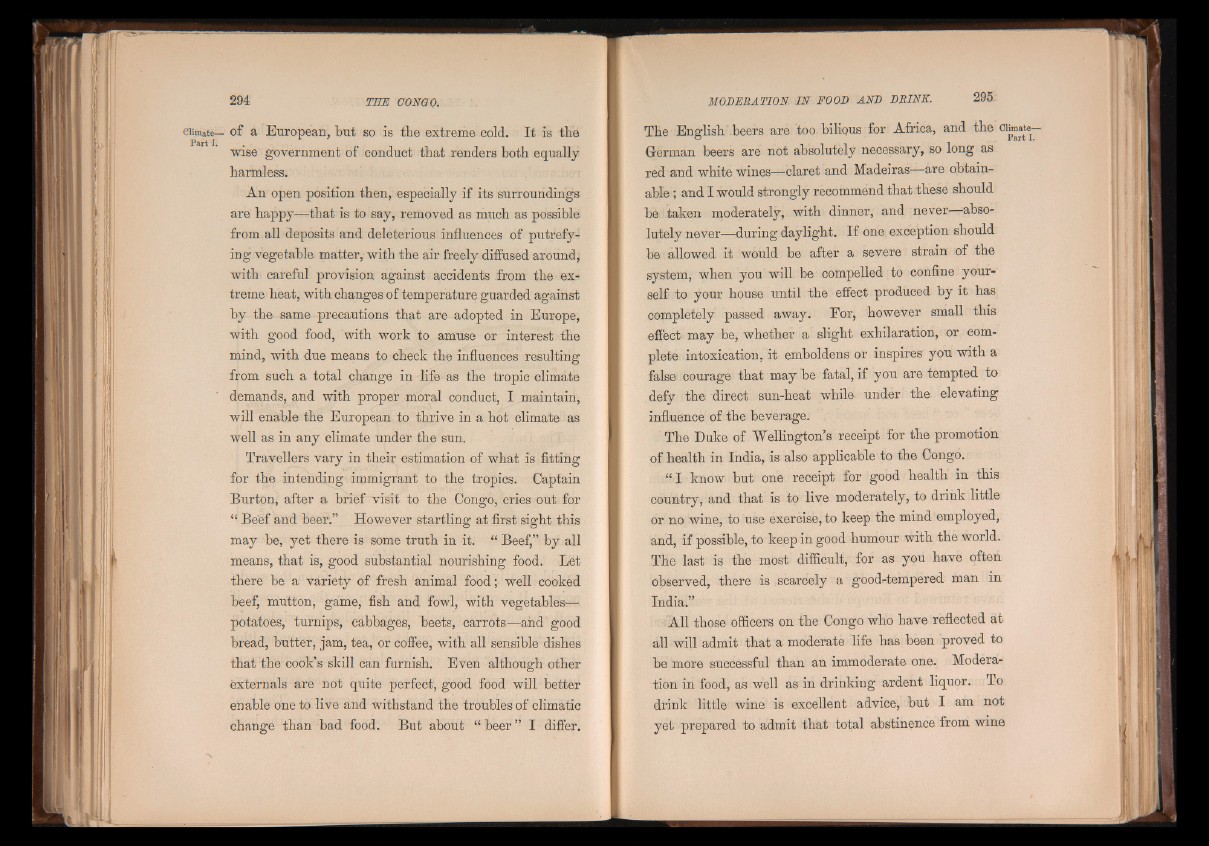
of a European, but so is the extreme cold. It is the
wise government of conduct that renders both equally
harmless.
An open position then, especially if its surroundings
are happy—that is to say, removed as much as possible
from, all deposits and deleterious influences of putrefying
vegetable, matter, with the air freely diffused around,
with careful provision against accidents from the extreme
heat, with changes of temperature guarded against
by the same precautions that are adopted in Europe,
with good food, with work to amuse or interest the
mind, with due means to check the influences resulting
from such a total change in life as the tropic climate
demands, and with proper moral conduct, I maintain,
will enable the European to thrive in a hot climate as
well as in any climate under the sun.
Travellers vary in their estimation of what is fitting
for the intending immigrant to the tropics. Captain
Burton, after a brief visit to the Congo, cries out for
“ Beef and beer.” However startling at first sight this
may be, yet there is some truth in it. “ Beef,” by all
means, that is, good substantial nourishing food. Let
there be a variety of fresh animal food; well cooked
beef, mutton, game, fish and fowl, with vegetables—
potatoes, turnips, cabbages, beets, carrots-—and good
bread, butter, jam, tea, or coffee, with all sensible dishes
that the cook’s skill can furnish. Even although other
externals are not quite perfect, good food will better
enable one to live and withstand the troubles of climatic
change than bad food. But about “ beer ” I differ.
The English .beers are too bilious for Africa, and the oiimate-
Glerman beers are not absolutely necessary, so long as
red and white wines—claret and Madeiras—are obtainable
; and I would strongly recommend that these should
be taken moderately, with dinner, and never—absolutely
never—during daylight. If one exception should
be allowed it would be after a severe strain of the
system, when you will be compelled to confine yourself
to your house until the effect produced by it has
completely passed away. For, however small this
effect may be, whether a slight exhilaration, or complete
intoxication, it emboldens or inspires you with a
false courage that may be fatal, if you are tempted to
defy the direct sun-heat while under the elevating
influence of the beverage.
The Duke of Wellington’s receipt for the promotion
of health in India, is also applicable to the Congo.
“ I know but one receipt for good health in this
country, and that is to live moderately, to drink little
or no wine, to use exercise, to keep the mind employed,
and, if possible, to keep in good humour with the world.
The last is the most difficult, for as you have often
observed, there is scarcely a goodrtempered man in
India.”
All those officers on the Congo who have reflected at
all will admit that a moderate life has been proved to
be more successful than an immoderate one. Moderation
in food, as well as in drinking ardent liquor. To
drink little wine is excellent advice, but I am not
yet prepared to admit that total abstinence from wine